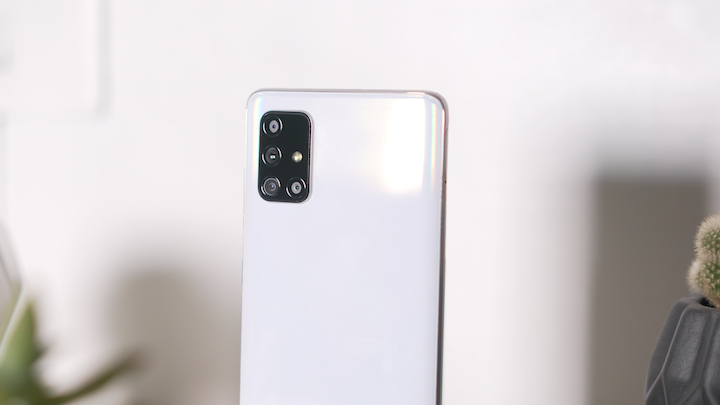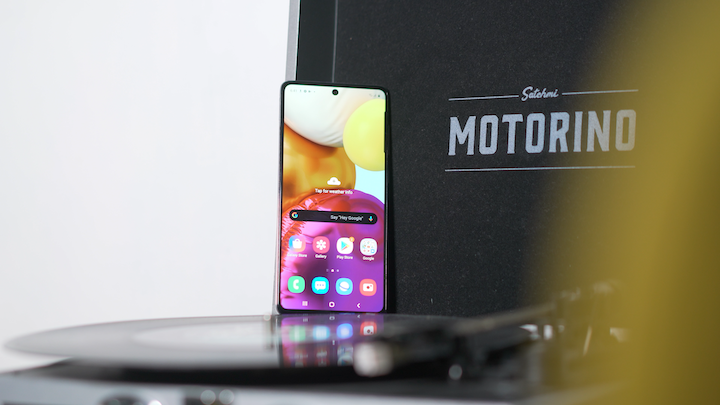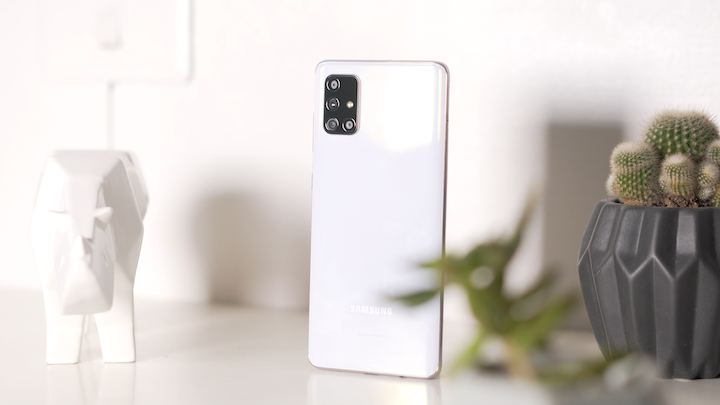Samsung recently launched its newest mid-ranger, the Galaxy A71, in the Philippines. We did a quick hands-on take of it a couple of days ago, and we spent some quality time with for a full spin.
Table of Contents
Is it a worthy enough upgrade from its predecessor, the Galaxy A70? Find out in our review.

The rear of the Galaxy A71 is designed with what Samsung dubs as a “Prism” effect. There are diamond shapes on the back, layered with a subtle linear pattern. The unit we have here is in Prism Crush Silver; it’s pleasing to look at with the rainbow hue streaks that show up when it catches the light. Apart from this colorway, the A71 is also offered in Prism Crush Black and Prism Crush Blue. Despite the attractive rear, the finish is glossy plastic, and it endlessly attracts fingerprints.

Upfront, the A71 has a Super AMOLED Plus Infinity-O display that’s pretty sizable at 6.7-inches. Slim bezels surround the screen, and it employs a hole-punch module for its front camera.

For its rear cameras, the A71 has a quadruple setup, situated inside a rectangle-shaped module. It’s placed on the upper left corner of the back, and the module is slightly raised from the rear. The LED flash is also contained inside the rectangular module.

The volume rocker and the power button are located on the right side of the device. Individuals with smaller hands might find it a hassle to press one-handed.

On the left, one can find the dual SIM tray with a dedicated microSD card slot.

Placed at the top is a microphone.

Sitting at the bottom is a 3.5mm headphone jack, a USB Type-C port, a noise-canceling microphone, and a single downward-firing speaker.
Overall, the A71 is thin and lightweight, despite its massive size. Also, even if it’s lightweight, the smartphone is solid and robust. The rounded corners also make it comfortable to hold.
As mentioned, the A71 sports a massive 6.7-inches display. It’s immersive, given the thin bezels around the panel and the hole-punch front camera that isn’t quite as obstructive as notches. Thanks to its Super AMOLED Plus panel, the colors are vibrant and punchy, and blacks come out deep as well. Panel brightness is also excellent; we had it set around 40%, and we had no trouble using it under direct sunlight.

As for audio, it’s average at best. It can get loud and fill a room, but it can get distorted at times when the volume is set to maximum. Mids and highs are present, but the lows are pretty much absent.
The A71 possesses a 32MP hole-punch camera, while quad setup on the rear is composed of a 64MP primary shooter, a 12MP ultra-wide, 5MP depth, and a 5MP macro snappers. Let’s dive into them.

First up, the 32MP selfie camera. Photos produced by the front camera are quite impressive; they look natural under ample lighting, with good colors and decent details. With the beauty mode switched on, imperfections get blurred out, and the skin looks pretty smooth. However, going past beauty level 2 will result in overly-processed selfies. Portrait-wise, Samsung lets its users modify the blur strength. Subject-background separation is present, but it’s quite messy as the blurring around the edges appears harsh and glaring.
The rear cameras also take decent photos with good colors and ample details. The images produced are satisfying enough to be shared on social media. Using the ultra-wide lens, there’s a slight fish-eye effect to the photos, and the colors tend to appear a little darker than the primary camera. Similar to the portrait selfie images, the rear’s portrait mode also allows its users to control the blur strength. The subject-background separation on the rear cameras is quite better than the selfie mode as the edges don’t appear too harsh.
Video-wise, the Galaxy A71 can shoot up to 4K at 30fps. The device does note that if you prefer to shoot in 4K, the resolution won’t support video effects and video stabilization. Shooting videos in 1080p does have video stabilization, and it’s pretty good overall.
Samsung One UI 2.0, based on Android 10, acts as the A71’s operating system. Users have the option of arranging the apps in a home screen style, or a home screen and apps screen (drawer) layout instead. For navigation, it can be changed from a three-button layout to a gesture-based one.

There’s also an Edge panel that users can pull up from the right side of the screen; it can contain apps for quick access, smart select tools for screenshots, and button tools such as the compass, flashlight, ruler, and the like.

Out of the box, the A71 comes pre-installed with the usual Google services, and Samsung apps such as the Galaxy Store, Samsung Global Goals, Samsung Max, Samsung 321, Game Launcher, Samsung Health, Galaxy Wearables, Bixby, and more. For third-party apps, Netflix, Spotify, and Lazada are pre-installed as well.
Storage-wise, the A71 comes with 128GB of space, expandable up to 512GB via a dedicated microSD slot. Out of the 128GB storage, 114GB of it is usable.
Under the hood, the A71 is armed with a Qualcomm Snapdragon 730G chipset, paired with 8GB RAM. We ran the A71 through a couple of our standard benchmarks, and here are the results:

Basic tasks such as navigation, web and social media browsing, messaging, and such isn’t a problem with the A71. Multitasking wasn’t an issue as well; the A71 was able to handle pretty much any task we threw at it. Gaming-wise, we tested out Call of Duty, and we didn’t experience any noticeable lags or frame drops.
For biometrics, the A71 has an on-screen fingerprint scanner and face unlock. Face unlock works pretty well; on the other hand, there are a few hiccups with the fingerprint scanner. It takes a second for the device to open, and there are times when the sensor doesn’t recognize the fingerprint, resulting in needing to press down a little hard on the screen for it to unlock.
Usual connectivity features such as 4G LTE, WiFi, Bluetooth, and GPS can be found on the A71. Using location-based apps weren’t a hassle as well as we were able to pin down locations pretty accurately on the map. The A71 also has NFC support.

Equipped inside the A71 is a 4,500mAh battery. We couldn’t run it through the usual PCMark battery test as the app kept crashing on us. Instead, we subjected it through our video loop test — 1080p video, 50% brightness, 50% audio, airplane mode, with earphones plugged in — and the A71 scored us a total of 21 hours and 22 minutes. The device has a USB Type-C port and also has 25W charging support. It took us an hour for the A71 to charge up to a full 100%.
So, do we think that the Galaxy A71 is a decent upgrade from its predecessor, the A70? Yes, absolutely. It retains the same screen size as the A70 but has leveled up in several aspects, such as its chipset, RAM, and overall look.

The panel is bright and offers vivid colors, performance is pretty smooth, the battery life is impressive, and it produces decent photos with both the rear and front cameras. With its price tag of PHP 22,990USD 392INR 33,211EUR 373CNY 2,853, you might want to consider this competent mid-range smartphone in your options.
Samsung Galaxy A71 specs:
6.7-inch Full HD+ (2400 x 1080) Super AMOLED Plus Infinity-O display
Qualcomm Snapdragon 730G 2.2GHz octa-core CPU
8GB RAM
128GB storage
microSD up to 512GB (dedicated slot)
64MP F1.8 (main) + 12MP F2.2 (ultrawide) + 5MP F2.2 (depth) + 5MP F2.4 (macro), quad-rear cameras
32MP F2.2 front camera
4G LTE
Dual-SIM
WiFi
Bluetooth
GPS, A-GPS
Fingerprint scanner (on-screen)
Face Recognition
4,500mAh battery w/ 25W Super-Fast Charging
163.6 x 76.0 x 7.7 mm
179 g
Prism Crush Black, Silver, Blue
What we liked:
What we didn’t:

YugaTech.com is the largest and longest-running technology site in the Philippines. Originally established in October 2002, the site was transformed into a full-fledged technology platform in 2005.
How to transfer, withdraw money from PayPal to GCash
Prices of Starlink satellite in the Philippines
Install Google GBox to Huawei smartphones
Pag-IBIG MP2 online application
How to check PhilHealth contributions online
How to find your SIM card serial number
Globe, PLDT, Converge, Sky: Unli fiber internet plans compared
10 biggest games in the Google Play Store
LTO periodic medical exam for 10-year licenses
Netflix codes to unlock hidden TV shows, movies
Apple, Asus, Cherry Mobile, Huawei, LG, Nokia, Oppo, Samsung, Sony, Vivo, Xiaomi, Lenovo, Infinix Mobile, Pocophone, Honor, iPhone, OnePlus, Tecno, Realme, HTC, Gionee, Kata, IQ00, Redmi, Razer, CloudFone, Motorola, Panasonic, TCL, Wiko
Best Android smartphones between PHP 20,000 - 25,000
Smartphones under PHP 10,000 in the Philippines
Smartphones under PHP 12K Philippines
Best smartphones for kids under PHP 7,000
Smartphones under PHP 15,000 in the Philippines
Best Android smartphones between PHP 15,000 - 20,000
Smartphones under PHP 20,000 in the Philippines
Most affordable 5G phones in the Philippines under PHP 20K
5G smartphones in the Philippines under PHP 16K
Smartphone pricelist Philippines 2024
Smartphone pricelist Philippines 2023
Smartphone pricelist Philippines 2022
Smartphone pricelist Philippines 2021
Smartphone pricelist Philippines 2020
Marion says:
Can its front cam record in 4k 30fps? There are some reviews that it can, while some otherwise.
Growwe says:
Thanks